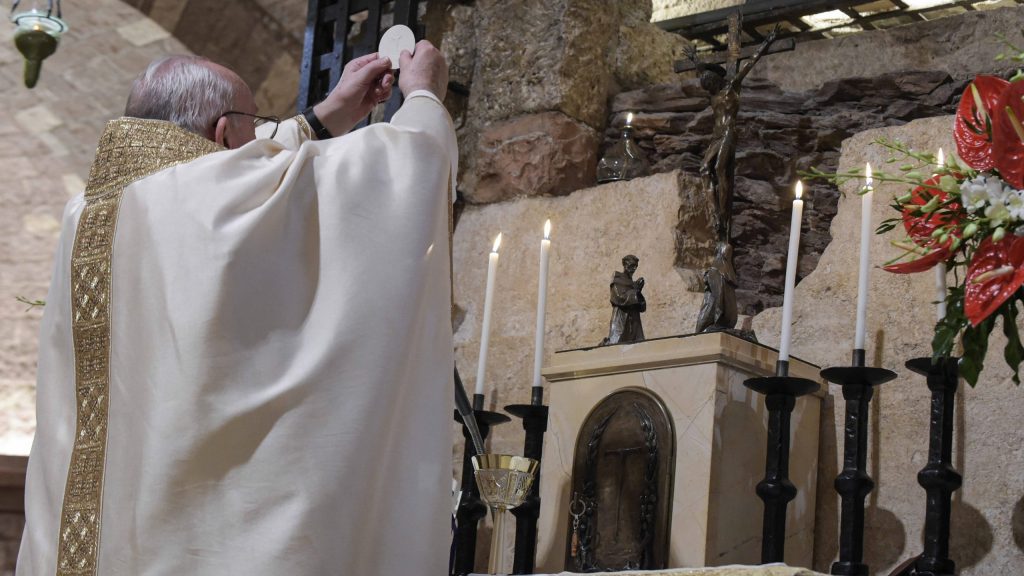Pope Francis’ new encyclical letter, “Fratelli Tutti” is a deep and searching reflection on the meaning of human community and how God wants us to live together in society.
It comes at a time in this country when there is a widespread feeling that social trust has broken down. It is a moment when people have lost faith in our institutions and leaders, and our politics and media have become angry and divisive.
Often, it seems, we now look with suspicion at those who disagree with us; we treat them like enemies. It seems to many of us that our society has lost not only the ability to work together for the common good, but also any sense of what the common good might be.
Beyond the differences between candidates and parties in this election year, beyond the real inequalities and injustices in our society, and beyond the fear and uncertainty for the future caused by the pandemic, these are the deeper issues that we must confront in American culture and public life.
And while “Fratelli Tutti” was not written specifically to address this country, as I have been reflecting on this new letter I think our Holy Father offers us a way forward.
It is a long and complex document. In many ways, it serves a compendium of Pope Francis’ teachings on social questions over these eight years of his papacy.
At the heart of the pope’s letter, though, is the simple and beautiful vision of the Gospel — that God our Father has created every human being with sanctity and dignity, with equal rights and duties, and that our Creator calls us to form a single human family in which we live as brothers and sisters.
Living as we do in a big country and in a complex mass society, we can be tempted to think that what we do as individuals does not matter or make a difference.
That is not true, the Holy Father reminds us. So much depends on how we live out our faith in Jesus Christ.
If we believe that God is our Father, then we must believe and act as if all men and women are our brothers and sisters. If we believe that Jesus died for the love of every person, then we know that “no one is beyond the scope of his universal love,” as the pope writes.
Along with St. Francis of Assisi, who he said inspired his letter, the pope points to the example of the 20th-century saint, Blessed Charles de Foucauld, who lived among the Muslims in the deserts of Africa and was martyred there.
Like St. Francis, Blessed Charles prayed to be “the brother of all.” And that is how we should live our lives.
The pope wants us to see that we are responsible to care for one another, that we are called to create a shared community in which the sanctity and dignity of every human person is cherished and respected.
In this way of social friendship, the little things in life matter. The pope speaks of the importance of simple, everyday kindness.
But kindness, for the pope, is not simply a personal virtue. Kindness can change the world. “Precisely because it entails esteem and respect for others, once kindness becomes a culture within society it transforms lifestyles, relationships, and the ways ideas are discussed and compared,” he writes.
The pope offers a hopeful vision for the renewal of politics, what he calls a “better kind of politics,” rooted in love for the human person.
But we should not “expect everything from those who govern us,” he says. We have a Christian duty to change the world, beginning in our neighborhoods and local communities, but also taking an active role in the affairs of our nation and being concerned for people everywhere in the world.
“Jesus asks us,” the pope writes, “to put aside all differences and, in the face of suffering, to draw near to others with no questions asked. … I must myself be a neighbor to others.”
In the Gospel vision, as the pope sees it, charity cannot be separated from working for justice. “It is an act of charity to assist someone suffering, but it is also an act of charity, even if we do not know that person, to work to change the social conditions that caused his or her suffering,” he writes.
There is much to challenge us in this new letter and I hope that you will have a chance to reflect on the Holy Father’s words.
Pray for me this week and I will pray for you.
And let us ask our Blessed Mother Mary to pray for our country as we enter the final days of this election season. May she help us to renew our country in the spirit of fraternity, where we see one another as Pope Francis tells us, “brothers and sisters all.”

